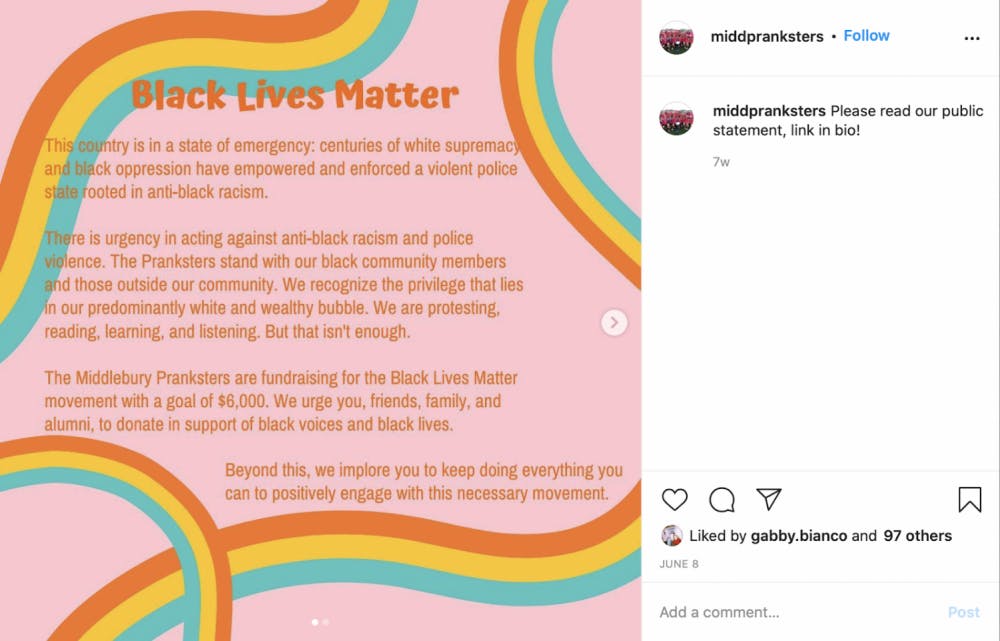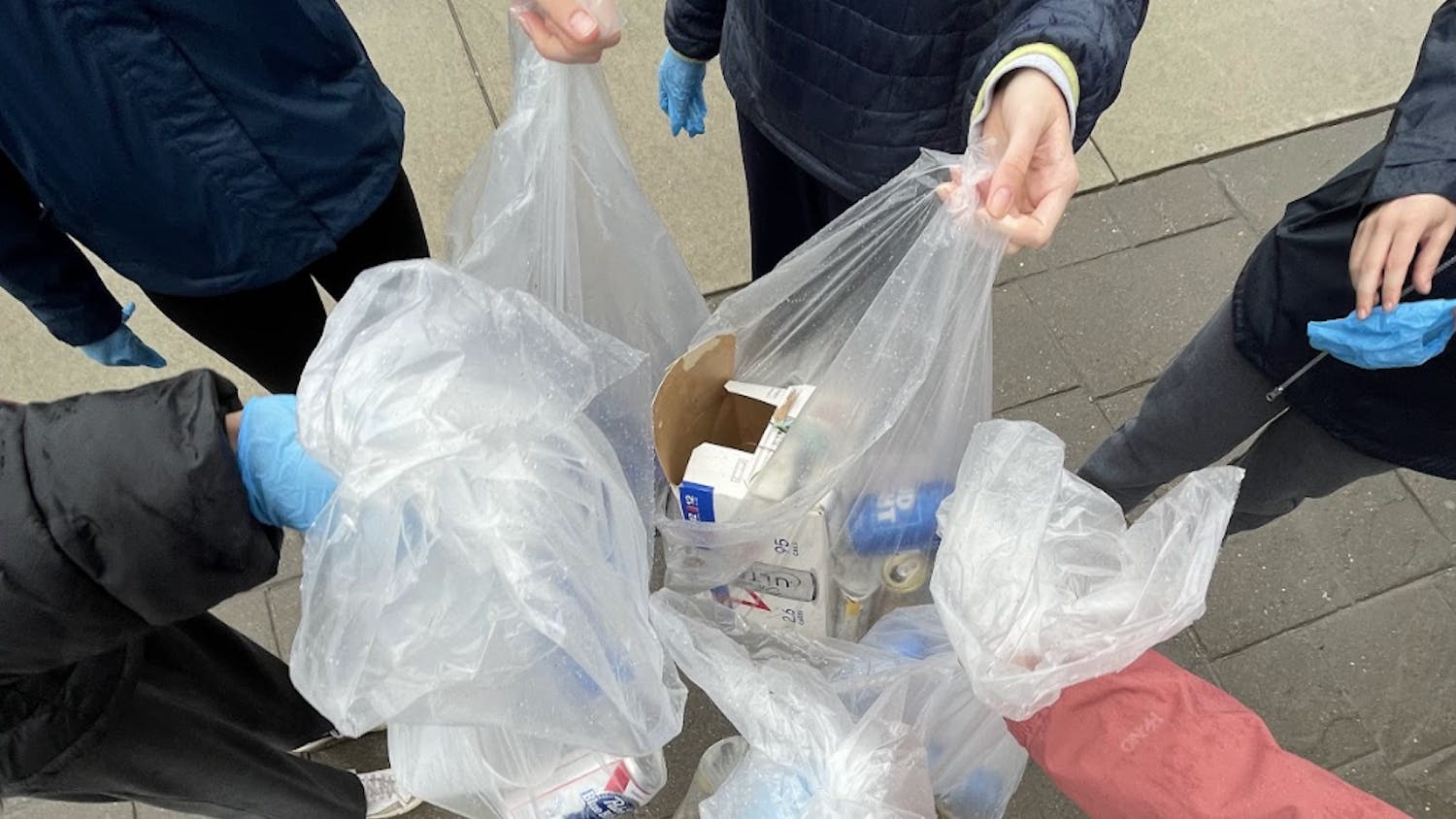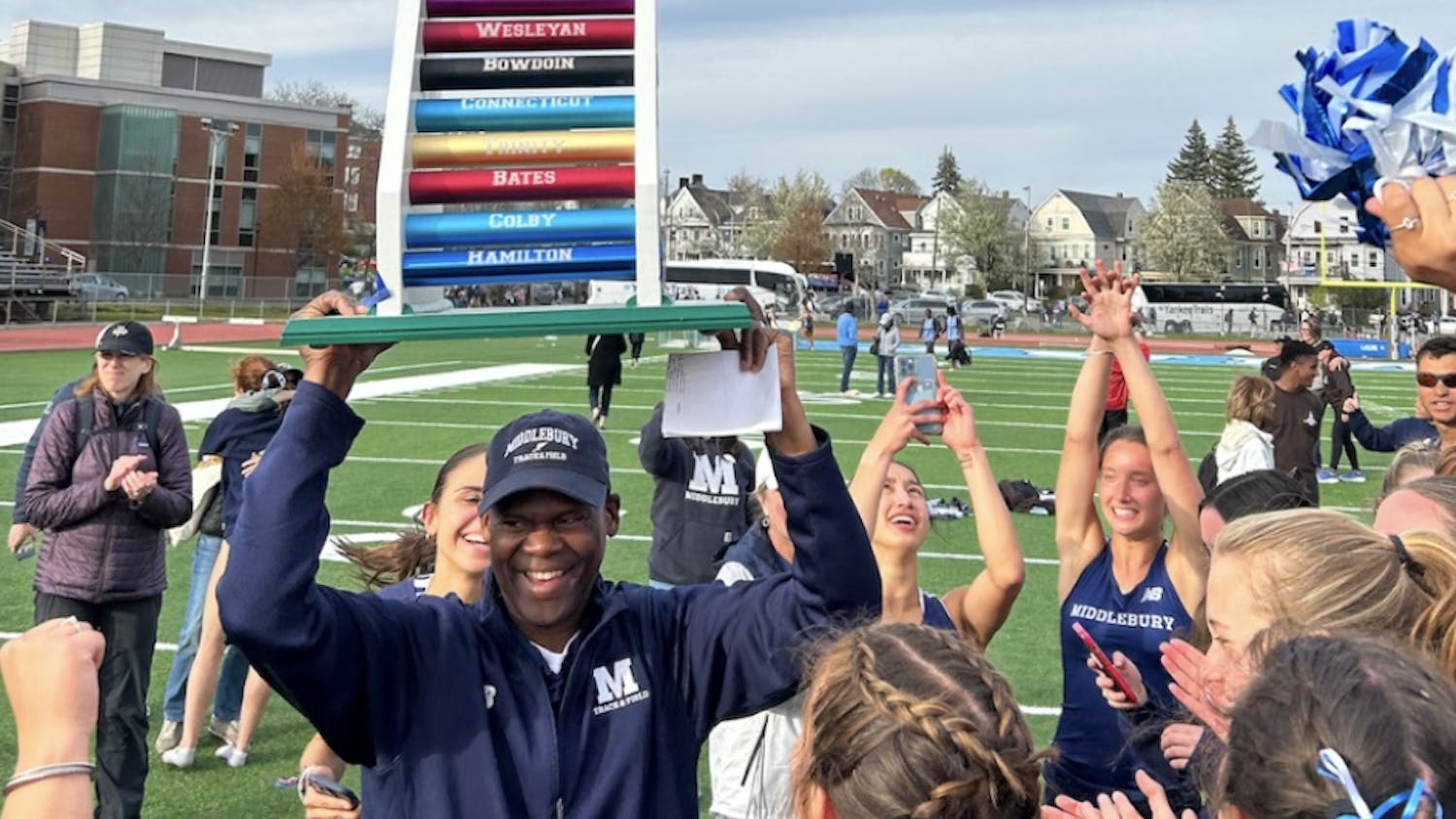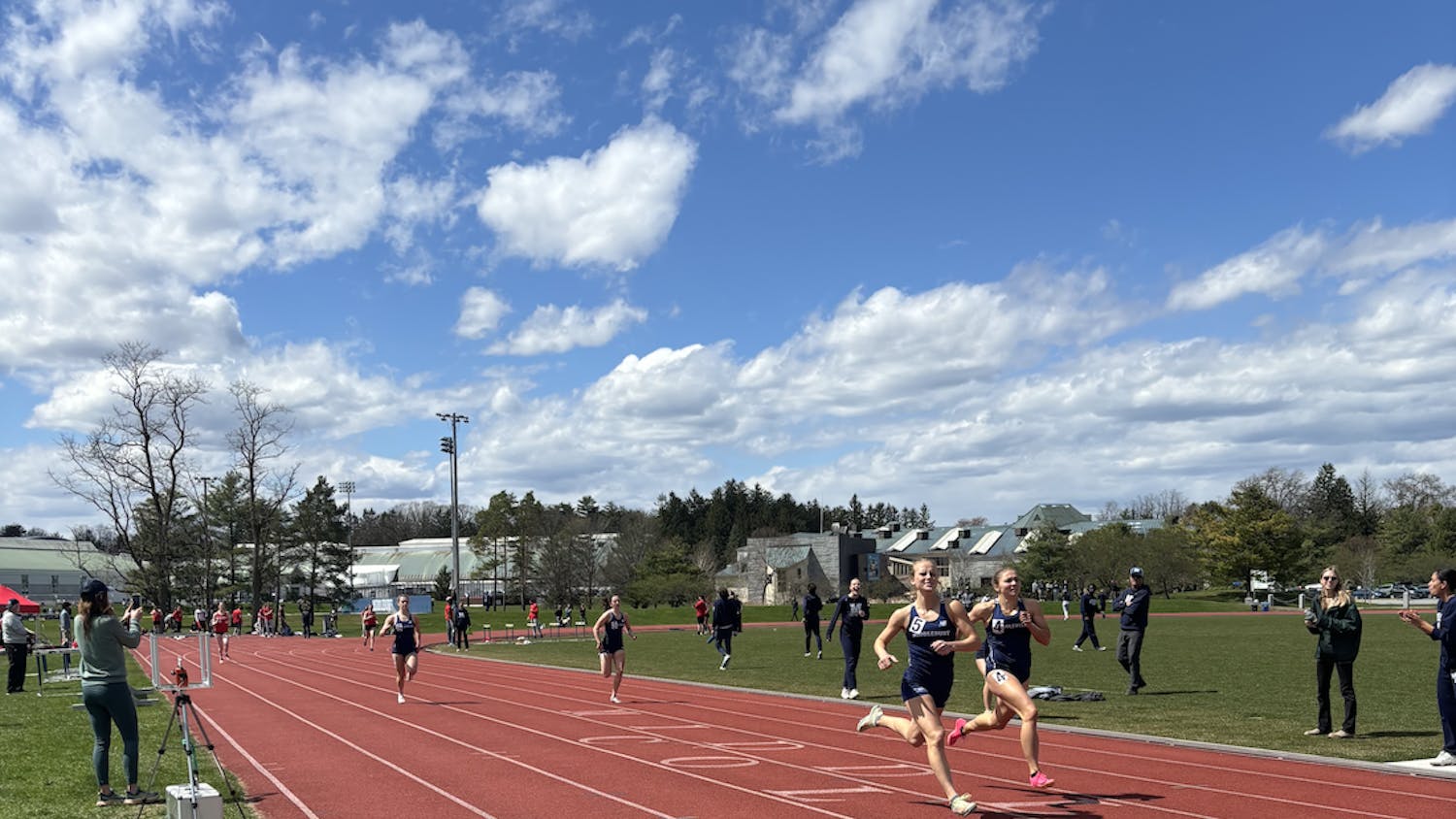In the wake of nationwide protests against police brutality and systemic racism, universities across the country are confronting their own issues of racism and exclusivity. Varsity and club sports teams at Middlebury have begun to examine privilege and exclusion present within their own groups, and some are taking direct action to foster an environment welcoming to all members.
Varsity teams reexamine recruiting practices
An open letter penned by Middlebury athletes across sports and addressed to the athletics department petitions coaches and faculty to shift practices to better serve underrepresented communities, widen geographic areas of recruitment and deprioritize recruiting trips.
The letter asks that the athletics department move recruiting efforts online to better reach individuals who cannot afford to fund their own recruiting trips, and to shift away from prioritizing face-to-face recruitment interactions, which disenfranchise certain potential athletic recruits.
“Quite simply, we are calling for the demographics of Middlebury student-athletes to better represent those of our country and world,” the letter reads.
The Middlebury track and field team is taking the matter into its own hands, developing a new student-led recruiting strategy. “Student-athletes will recruit high school track and field [and] cross country athletes from racially and socioeconomically diverse high schools located in the Middlebury student’s hometown,” said track athletes Greta Sirek ’22, Grace Kirkpatrick ’22, and Kate Holly ’21.
The swimming and diving team at Middlebury is exploring a similar strategy.
Swimmer Courtney Gantt ’22 is among those who want to make Middlebury’s swim and dive team more diverse and inclusive. “This could include expanding opportunities for virtual recruiting trips if people cannot afford to come to campus or bringing Middlebury admissions representatives to more [places] where there are high POC populations that may not know about Middlebury otherwise,” Gantt said.
The swimming and diving team is predominantly White — in fact, there were no Black athletes on the 2019–2020 roster. In addition to addressing recruitment tactics, the team is also working on educating themselves about race and swimming.
This meant organizing conversations concerning race and diversity in the sport with Director of Equity and Inclusion Renee Wells. Gantt emphasized the importance of engaging in these difficult conversations as a team in order to make a difference both in and out of the pool.
“Our team is making a commitment to educate ourselves about the history of race and swimming and the different access that Black people have had to higher education, jobs, healthcare and all spheres of life,” Gantt said.
The swim and dive team also plans to provide more swim lessons to low income families in the area to expand access to swimming.
The women’s soccer team also reflected on their presence on campus as a majority White team by hosting team meetings with faculty to discuss anti-racism. “We hope to make efforts to diversify our team and are looking into tangible ways we can do that throughout the summer and when we get back to campus,” Ellie Bavier ’22 said.
Club sports take on addressing Whiteness and exclusion
Although club sports teams often offer messages of inclusion in their recruiting and mission statements, many face similar issues of exclusion and discrimination.
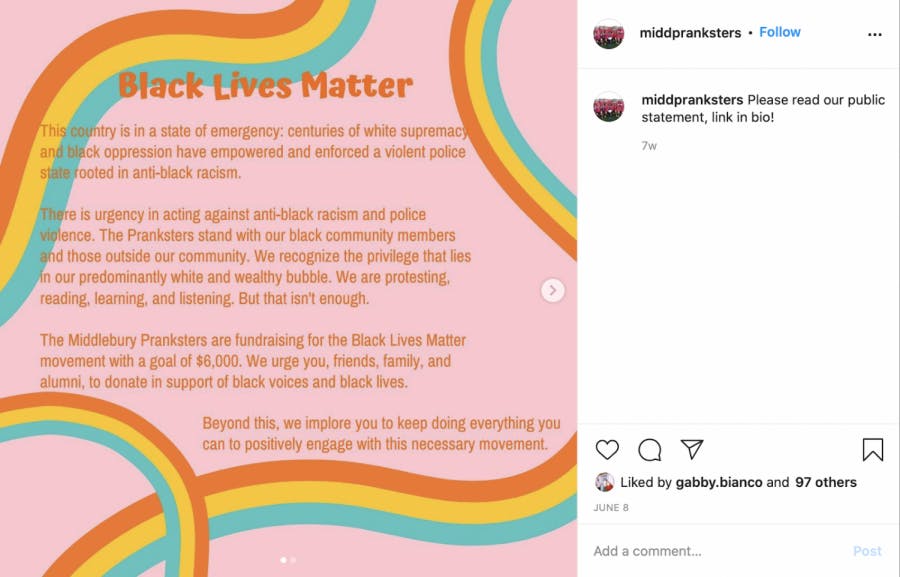
Alyssa Brown ’20 is a member of the Middlebury ultimate frisbee team. In Brown’s memory, there have been few to no Black players on the men’s and women’s frisbee teams. Brown attributes much of this lack of diversity to frisbee’s origins as a countercultural sport that has historically been played in majority White and wealthy communities.
“The Pranksters have certainly come a long way since 2016 in terms of intentional learning and commitment to inclusivity, but students of color still do not feel welcome, so there is still a problem,” Brown explained.
Because club sports do not receive the same funding as varsity sports on campus, teams often count on players and their families to make monetary contributions. Although Brown said the Pranksters have always tried to be inclusive by providing monetary aid for those who need it, the personal funds needed for team social activities can be hindering.
“Being surrounded by a community that is interpreted as ‘wealthy’ can generally be discouraging for low-income students,” Brown said. “This is also important to note because race and class are undeniably linked, although obviously it’s case by case.”
Rugby has made steps to decrease the stress that can be created through these required finances. Freshmen are no longer required to pay the annual dues, and players have the option to rent equipment and gear instead of buying.
Megan Salmon ’21 also spoke of issues with racist culture that the team had five years ago. “There was an alum who had a position of power on the team who abused it and created a very racist and generally unwelcoming environment on the team,” Salmon said.
“In the years since, it’s my personal opinion that the women's rugby team has done an excellent job of turning around the culture by having meetings discussing the harm and racism, and gradually having more and more BIPOCs present in our leadership positions. Not intentional, but it helped.”
Salmon and her teammate Lenny Gusman ’21, both athletes of color, recently facilitated a two-hour dialogue about the history of the prison-industrial complex and policing and how they impact the team and team culture. They plan to continue the conversation by conducting similar meetings throughout the semester.
The Pranksters are also having conversations about race and inclusion. Since 2018, the team has held a community workshop each semester with the goal of creating a more inclusive team environment. At these meetings, leaders of the men’s and women’s teams discuss the barriers that are presented through the sport of frisbee and set expectations on how to lessen these obstacles.
Now, both the men’s and women’s frisbee teams are committed to adopting the format of these workshops to address issues of Whiteness and exclusivity within the sport.
The crew team is in the same boat. “Issues of exclusivity on our team are evident from the overwhelming Whiteness of our membership, high rates of attrition of BIPOC from our team and the unacceptable acts of discrimination, notably microaggressions, that many of our rowers of color have experienced,” captain Sophie Smith ’21 said.
Smith explained that the team is planning on changing their financial aid and fundraising system, as well as increasing flexibility to the practice schedule to remove barriers for members who may need to work to support their education. The team is also considering adding new leadership positions, such as a novice captain position, to ensure these changes will be as impactful as possible.
Above all, athletes of color emphasised the necessity of a cultural shift in making long lasting changes.
“I think it’s important to address the reason why POCs are not joining the teams and tackling them instead of just giving into the consensus that Middlebury club sports are just predominantly White and we can’t do anything.” Gusman said. “Our team still has a long way to go just like everybody in this country, but I am proud of the active steps we have taken. Even if we think we are doing our best we can always do better.”
Student athletes raise funds for the Black Lives Matter movement
Many sports teams have also stepped up to raise money and awareness in support of the Black Lives Matter movement, using social media as a means to spread information.
The women’s swim and dive team organized a fundraising campaign, raising over $4,000 for the Rutland Area NAACP through a 48-hour “sweat-a-thon.” The team donated $1 for every minute of exercise logged and accepted donations through an online fund.
Gantt, along with fellow organizer Ellie Thompson ’22, said the fundraiser helped generate conversations about the Black Lives Matter movement among family and community members, who shared posts, educational materials and photos of their workouts on social media. Although she considers the fundraiser successful in garnering support from friends, family and alumni, she isn’t satisfied yet.
“We know that it is not enough to raise money,” Gantt said. “We must continue the conversation and do more.”
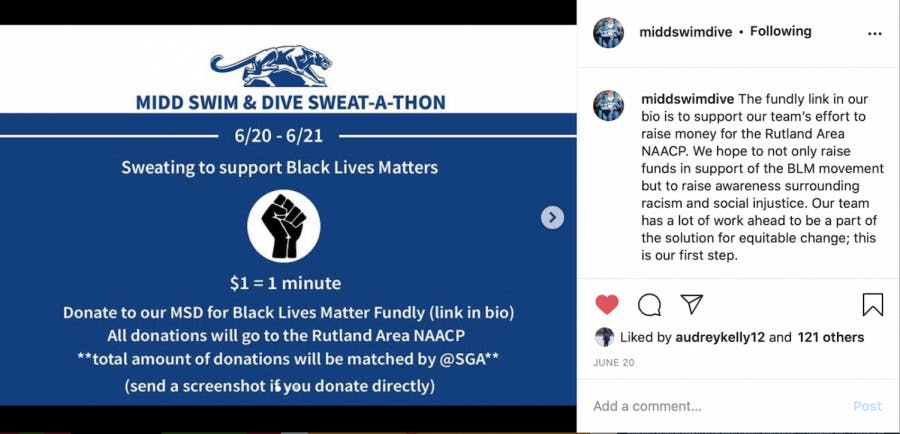
The women and men’s varsity squash teams fundraised a total of $12,260 for the Vermont branch of the ACLU’s Smart Justice Campaign. The teams chose to support a more local organization to “become more engaged with the problems of [their] wider community” and “to spread awareness about the prevalence of racism in Vermont,” according to their official statement. The teams held several discussions over Zoom and shared their learnings with friends, family, alumni and Instagram followers via an informational sheet as part of their fundraising efforts.
The squash program will continue their commitment to antiracism by appointing three “Social Justice representatives” who will lead conversations to “ensure awareness of systemic racism.” The teams also plan on designating one match each season as an annual fundraiser for a cause related to Black Lives Matter, according to their latest statement.
The women’s soccer team raised over $2,300 to donate to Bryan Stevenson’s Equal Justice Initiative (EJI), a non-profit organization providing legal representation for prisoners who have been wrongfully convicted, unfairly sentenced or abused in jail. Bavier said the team elected to support an organization that actively works to end mass incarceration and inspire lasting change within the criminal justice system.
“We appreciated the tangible legal steps implemented to create change, and we found their story incredibly compelling,” Bavier said.
The track and field team arranged a virtual 4,000-meter race on July 19 to collect money for the Know Your Rights Camp (KYRC) COVID-19 Relief Fund. Coordinated by Sirek, Kirkpatrick and Holly, the fundraiser supports communities of color that have been disproportionately affected by the coronavirus outbreak.
The three organizers explained that they chose the KYRC fund, which was founded by Colin Kaepernick in 2016, for its mission to engender social and economic change in Brown and Black communities across America. So far, the team has collected over $1,500 and expects more donations as the summer continues.
Several club sports teams have also joined the fundraising effort to support the Black Lives Matter movement within the sports arena and beyond.
Coordinated by Salmon, Gusman and teammate Betsy Romans ’23, women’s rugby hosted a fundraising campaign to support BLD PWR, a Black-run nonprofit organization dedicated to training a more diverse community of entertainers and athletes. The team challenges other clubs to do the same, without disclosing the amount of money raised to avoid performativity.
“We believe that group silence contributes to a lack of accountability among individuals which justifies neutrality and inaction — thus serving the agenda of the oppressor,” the team’s social media post stated. “For this reason, we challenge other Middlebury organizations to take the route of action rather than just words.”
Similarly, Middlebury’s ultimate frisbee team published a statement of their unequivocal support for the Black Lives Matter movement, outlining a course of action for implementing change in our communities.
The Pranksters also raised $4,818 to split between the NAACP Legal Defense and Educational Fund, the Marsha P. Johnson Institute, Black Lives Matter of Greater Burlington and Ultimate Impact through donations from team members, family, friends and alumni.
The sailing team recently collected funds to support Campaign Zero, an organization dedicated to researching policy-based solutions for ending police brutality and urging other NEISA (New England Intercollegiate Sailing Association) to take action. Middlebury’s sailing team is also part of NEISA’s Equity and Inclusion Committee, which elects one representative from each team in the league to discuss issues of exclusivity within the sport of sailing.
Middlebury’s crew team gathered monetary donations for three organizations, including the NAACP, National Bail Out and Row New York, which provides academic and athletic support for youth, regardless of background or rowing ability.
While team fundraising campaigns have helped spread awareness and raise funds to support anti-racist organizations, each team recognizes that the pocketbook itself is not powerful enough to create permanent change.
“We are hopeful that there will be changes at an institutional level to do more to bring prospective POC athletes to Middlebury and increase teams’ diversity,” Gantt said. “We must increase access to our school and our sport so that more Black leaders can emerge and contribute their voice to the national conversation.”
Copy Editor Ideal Dowling ’22 contributed reporting.

Brinlea La Barge '23 is the senior news editor.
She previously served as news editor and sports editor. La Barge studies English and Linguistics at Middlebury and is a peer writing tutor and captain of the women's tennis team.
She spent the summer of 2022 as a communications intern for the Josh Shapiro for Governor campaign, and previously worked for Nantucket Magazine and WHYY, Philadelphia's local PBS and NPR affiliate.

